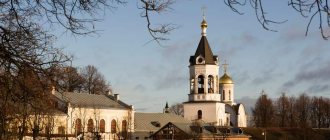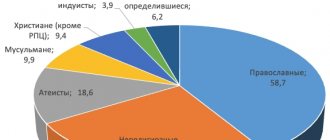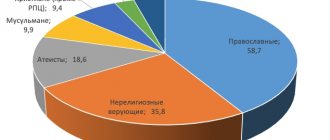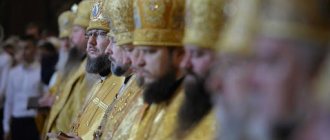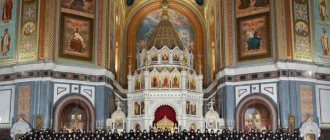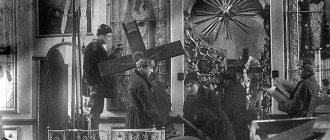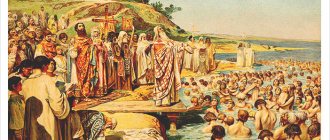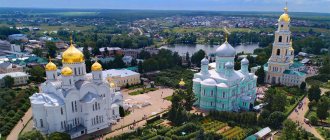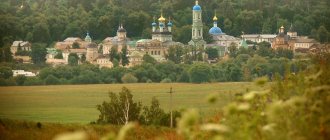To understand the intricacies of different religious movements, to understand the philosophy of religion and the psychological characteristics of believers - all this can be learned at universities studying theology and religious studies.
We will talk about where religious studies is taught and how to enroll in theology at a university in our article and publish a list of universities in Moscow and Russia where there are such faculties.
Do you want to be the first to receive useful materials from the world of education? Subscribe to our information portal. And don’t forget to follow the company’s promotions and discounts.
Help is needed?
Entrust your work to a PhD candidate!
Where do they study religious studies and theology?
Before giving a list of specialized universities and institutes, it is worth understanding the terms “religious studies” and “theology”. Is there a difference or are they complete synonyms?
Religious studies is a humanitarian science that studies world religions, the history of their formation, philosophy, customs and traditions of different faiths, as well as the psychology of religion.
Theology, or theology, is the doctrine of God in a specific religious teaching: Orthodoxy, Catholicism, Islam, Judaism, and so on. And the main task of a theologian as a specialist is to know and explain the features of individual religious movements.
It turns out that theologians and religious scholars study religion, but using different methods. The first ones are approached from scientific, historical, cultural and other points of view. And the second ones study religious texts and the main tenets of teachings. Religious scholars may doubt the existence of God, but theologians may not, otherwise they would not be able to do their job.
Therefore, in order to become a religious scholar, it is worth considering departments of religious studies in Russian universities. And to get a theological education, there are theological universities and departmental programs where they study theology in secular universities.
In 2022, the Ministry of Justice of the Russian Federation approved an academic degree in theology. This provided an opportunity to develop departments of theology in Russian universities and train specialists in this area.
What do graduates do?
The main field of activity of future masters is education and science.
Experts write expert articles, annotations, reviews, surveys, reports on theological issues, and also conduct research in the field of history and theory of religion.
In addition, they can coordinate interfaith programs and resolve conflicts between faith groups.
To work, masters need to know the basics of philosophy, sociology, and world history.
Graduates should be well versed in primary sources on the topic being studied, the main religious events of the eras, and understand the principles of social development.
Skills
In accordance with the passport of competencies, after graduation, masters must be able to:
- conduct scientific research in the field of theory and history of religion, philosophical problems of existence and civilization;
- write annotations, reviews, abstracts on the topic;
- resolve interfaith conflicts;
- systematize publications on religious and cultural heritage, compile dictionaries and bibliographic lists;
- prepare materials and speeches for the media and public organizations;
- teach basic theology in colleges and universities.
Disciplines
The work program includes general cultural and specialized theoretical modules. Master's students must master the methodology of the humanities, the history of theology, modern problems of religion, information technology, philosophy, and a foreign language. The content of the profile part of the plan corresponds to the chosen educational program.
Students can study:
- history of theological science and education in Russia;
- theological problems of modern Catholicism;
- church-state relations;
- sources of Russian religious philosophy;
- theological translation from a foreign language;
- theological problems of world culture;
- history of the study of Christian theology;
- problems of Christian mysticism;
- traditions of church catechesis.
Practice
According to the state standard, undergraduates undergo educational and practical training, which involve research, teaching, missionary, and liturgical activities. The internship is implemented on the basis of the university, municipal and religious institutions.
How to apply for religious studies and theology
To enroll in a bachelor's degree in religious studies, the specialty code of which is 03/47/03, you will need to take the following basic subjects:
- Russian language;
- history.
And additional ones may include:
- social science;
- foreign language;
- literature;
- geography.
By the way! Our readers now have a 10% discount on any type of work.
The famous Hungarian philosopher and religious scholar Mircea Eliade wrote many significant books on the history of religion. Among them are “History of Faith and Religious Ideas” in three volumes, “Yoga: Immortality and Freedom”, “Religions of Australia” and others.
And in order to enroll in the specialty “Theology” at universities, which has code 48.03.01, it is necessary to prepare the following subjects:
- The main subject is Russian.
And from the additional ones, choose two items from the following:
- history;
- social science;
- literature;
- foreign language;
- geography.
Very often, many theological universities conduct additional tests among applicants to assess the level of their intellectual and moral preparation.
Exams for admission
Candidates are admitted to the course after successfully passing a comprehensive entrance exam. The test is usually conducted verbally in the form of an interview, but testing may be offered. The knowledge testing program involves questions in the following areas:
- Holy Bible;
- ecclesiology;
- modern problems of theology;
- dogmatic theology;
- liturgics and sacramentology.
Admission can also be based on a portfolio, which represents the applicant’s achievements and goals. These include a diploma of theological education, a motivation letter, and an essay.
List of Russian educational institutions specializing in religious studies
Let's look at which public and private universities in Moscow, St. Petersburg and other Russian cities you can study and receive the profession of “religious scholar.”
Religious studies: Moscow universities
List of Moscow universities that offer educational programs in religious studies:
- Moscow State University named after M.V. Lomonosov.
- Russian State University of Oil and Gas named after I.M. Gubkina.
- Russian State Humanitarian University.
Religious studies: universities in St. Petersburg
List of universities in St. Petersburg where you can study to become a religious scholar:
- St. Petersburg State University.
- Russian Christian Humanitarian Academy.
Religious Studies: other universities in Russia
You can study religious studies in other cities of Russia. Here is a list of some universities:
- Kazan (Volga region) Federal University.
- Ural Federal University named after B.N. Yeltsin.
- Saratov National Research State University named after N.G. Chernyshevsky.
- Altai State University.
- Chelyabinsk State University.
- Amur State University.
- South Federal University.
Programs
Universities offer several profiles related to the study of theological materials and books, religious movements and world faiths. Below are brief descriptions of examples of educational programs.
General and Russian Church History (PSTGU)
The profile introduces the problems of church-historical and theological study of religion in Russia. Masters who complete the course must understand and find answers to current Orthodox issues in society.
Systematic Theology of Confession (PSTGU)
Training program for specialists in the field of Orthodox theology. Graduates can work in various fields of humanitarian and social activities. Students study historical, philosophical and modern theology.
Modern Orthodox Theology and Catechetics (SFI)
The program introduces the problems of Orthodox theology, catechism, missiology, philosophy, biblical studies, and liturgics. Students learn to independently solve current problems of modern theology.
Orthodox theology of education and church educational policy (RHGA)
After completing the program, students become experts in the fields of theology, pedagogy, and sociology. Graduates can work in educational institutions and state-confessional organizations.
List of Russian educational institutions specializing in theology
If you want to study theology specifically, you should consider the following point when choosing a university: if you enroll in a secular university for the theological department, you will not be able to serve in church institutions.
This education will only help you gain an ideological or research position. If your goal is a church career, it is better to choose a training program at a theological university.
Theology: Moscow universities
To study in the specialization “Theology” in Moscow, you should take a closer look at the following universities:
- Orthodox St. Tikhon's Humanitarian University.
- St. Philaret Orthodox Christian Institute.
- Hebrew University.
- Slavic-Greek-Latin Academy.
- Moscow Orthodox Institute of St. John the Theologian.
- Moscow State Linguistic University.
- Russian State Social University.
- Moscow Islamic Institute.
Theology: universities in St. Petersburg
In St. Petersburg, you can study theology at the following universities:
- Russian Christian Humanitarian Academy.
Theology: other universities in Russia
In other cities of the Russian Federation there are also universities and institutes that offer applicants to study theology:
- Smolensk Orthodox Theological Seminary.
- Saratov National Research State University named after N.G. Chernyshevsky.
- Armavir Orthodox Social Institute.
- Belgorod State National Research University.
- Far Eastern Federal University.
- Tula State University.
- Tambov State University named after G.R. Derzhavina.
- Yaroslavl State Pedagogical University named after K.D. Ushinsky.
- Don State Technical University.
- Institute of History and Public Administration, Bashkir State University.
- Omsk State University named after F.M. Dostoevsky.
Look at examples of work and make sure that we will help you conscientiously!
We hope you understand the difference between religious studies and theology. This means that now you know exactly which universities that teach religion you should apply to.
And remember - if you need help during your studies, contact student services. Our experts will cope with even the most complex topics of term papers and dissertations so that you study with flying colors!
Educational process within the framework of the Theology program
The training program for future theologians includes the following aspects:
- Theoretical immersion in the profile . This moment involves the study of basic, general developmental and specialized disciplines with a gradual narrowing of subjects to highly specialized ones. The main emphasis is on studying terminology, basic rules and canons (religious features and traditions, canons and covenants, the order of organizing services, descriptions of posts and events).
- Practical immersion in a specialty that involves following already learned postulates: conducting basic rituals, observing general rules, following fasts, the specifics of clothing and speech, everyday life (daily routine, nutrition, behavior, etc.). Practical immersion most often occurs during internship or training at a religious center (for example, in Sunday schools, clergy centers, theological seminaries, etc.).
Ways to prepare qualified theologians
- Research Moment . This parameter is based on scientific immersion in the profession: conducting historical, sociological, philological research, assessing the spirituality of society and its problems, studying the problems of cultural and moral development of society, people’s attitudes towards religious organizations and religion, reviewing current problems in the religious sphere (from economic, political to moral, etc.). The training includes typical student work: tests, coursework, scientific projects, abstracts and reports, reviews, etc., as well as project activities - organization and conduct of services, preparation of materials, features of individual events (repose of the deceased, baptism of an infant, communion and etc.);
- Student certification . This stage takes into account not only the students’ knowledge of subjects or the field in general, but also the skills of their real application: adherence to religious and other canons, features of everyday life, organization of leisure time, etc. In addition to traditional oral exams, students will have a “practical test”: organizing events , description of the main actions in a particular case, reading prayers and chanting, etc.
The share of each stage of preparation depends on the perspective of the profession: pedagogy will focus on ways of transmitting religious experience, methods of teaching students, the scientific aspect - analysis of modern trends in a religious perspective, clergy - the education of certified clergy.
Any difficulties?
Need teacher help?
We are always happy to help you!
master's theses
